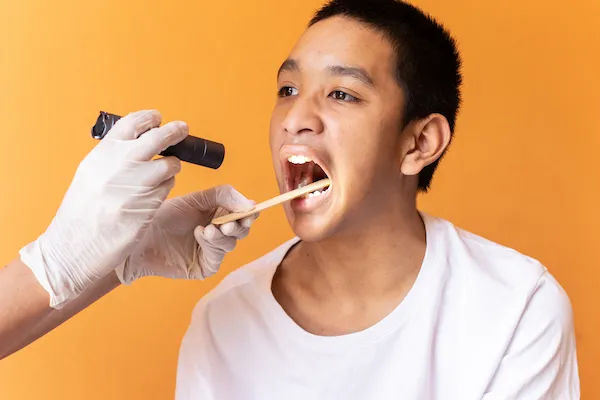Tonsil Stones Overview and Diagnosis
Explains tonsil stone symptoms, causes, diagnosis methods, and management tips, plus prevention strategies and when to seek medical advice.

Written by Dr. Mohammed Kamran
Reviewed by Dr. Dhankecha Mayank Dineshbhai MBBS
Last updated on 13th Aug, 2025

Tonsil stones, also known as tonsilloliths, are small, whitish-yellow lumps that form in the crevices of your tonsils. While they are usually harmless, they can cause discomfort, bad breath, and sometimes mild pain. If you’ve ever noticed small, hard particles in the back of your throat or experienced persistent bad breath, you might be dealing with tonsil stones.
In this article, we’ll explain what tonsil stones are, their symptoms, causes, and how they are diagnosed. We’ll also share some simple tips to manage them and when you should consider seeing a doctor.
What Are Tonsil Stones?
Tonsil stones are small deposits of bacteria, food particles, dead cells, and mucus that get trapped in the tiny pockets (crypts) of your tonsils. Over time, these materials harden and form small, stone-like lumps. They can range in size from tiny grains to larger, pea-sized formations.
While tonsil stones are not usually dangerous, they can cause unpleasant symptoms like bad breath, throat irritation, and difficulty swallowing. Some people may not even realise they have them unless they see or feel them.
Symptoms of Tonsil Stones
Not everyone with tonsil stones experiences symptoms, but common signs include:
- Bad breath (halitosis) – One of the most noticeable symptoms is due to bacterial buildup.
- White or yellowish lumps – Visible on the tonsils.
- Sore throat – Mild discomfort or irritation.
- Difficulty swallowing – Feeling like something is stuck in the throat.
- Ear pain – Sometimes, the pain can radiate to the ears.
- Metallic taste – Due to the presence of bacteria.
- Swollen tonsils – In some cases, the tonsils may appear inflamed.
If you experience frequent tonsil stones along with severe pain, fever, or difficulty breathing, it’s best to consult a doctor, as these could indicate a more serious infection.
What Causes Tonsil Stones?
Tonsil stones develop when debris gets trapped in the tonsil crypts and hardens. Factors that increase the risk include:
- Poor oral hygiene – Not brushing and flossing regularly allows bacteria to accumulate.
- Chronic tonsillitis – Repeated infections can enlarge tonsil crypts, trapping more debris.
- Large tonsils – People with naturally deep tonsil crevices are more prone to stones.
- Dry mouth – Saliva helps cleanse the mouth; reduced saliva can lead to a buildup.
- Diet – Consuming dairy or sugary foods can contribute to mucus and bacteria buildup.
How Are Tonsil Stones Diagnosed?
Most tonsil stones are visible upon examining the throat. A doctor or dentist may diagnose them by:
1. Physical examination – Using a light to check the back of the throat.
2. Imaging tests (if needed) – In rare cases, an X-ray or CT scan may be done if stones are deeply embedded.
3. Reviewing symptoms – Discussing bad breath, throat discomfort, or recurrent infections.
Consult Top Specialist
If you suspect you have tonsil stones but aren’t sure, you can gently check your tonsils in a mirror or consult a healthcare professional for confirmation.
Managing and Preventing Tonsil Stones
While tonsil stones aren’t usually harmful, they can be bothersome. Here are some ways to manage and prevent them:
1. Maintain Good Oral Hygiene
- Brush your teeth twice daily and floss regularly.
- Use an antibacterial mouthwash to reduce bacteria.
- Gently brush your tongue to remove debris.
2. Stay Hydrated
- Drinking plenty of water helps wash away food particles and bacteria.
3. Gargle with Salt Water
- Warm salt water gargles can help dislodge small stones and reduce bacteria.
4. Avoid Dairy and Sugary Foods
- These can increase mucus production, contributing to stone formation.
5. Use a Water Flosser or Cotton Swab
- A low-pressure water flosser can help remove debris from tonsil crypts.
- If visible, you can gently use a cotton swab to push out small stones, but avoid poking too hard to prevent injury.
6. Consider Medical Treatment if Needed
If tonsil stones are frequent and troublesome, a doctor may recommend:
- Laser treatment (cryptolysis) – To smooth out tonsil crevices.
- Tonsillectomy – Surgical removal of tonsils (only in severe cases).
When to See a Doctor
Most tonsil stones can be managed at home, but consult a doctor if you experience:
- Persistent bad breath despite good oral hygiene.
- Large or painful tonsil stones that won’t come out.
- Frequent infections, fever, or difficulty swallowing.
If you’re concerned about tonsil stones or need professional advice, you can book a consultation with an ENT specialist through Apollo 24|7 for expert guidance and treatment options.
Final Thoughts
Tonsil stones are a common and usually harmless condition, but they can be annoying. By maintaining good oral hygiene, staying hydrated, and following simple home remedies, you can reduce their occurrence. If they become a persistent problem, don’t hesitate to seek medical help.
Remember, your tonsils play a role in protecting against infections, so take care of them just like you would the rest of your body!
Need help? Schedule a consultation with an ENT specialist on Apollo 24|7 today for personalised care.
Consult Top Specialist
Consult Top Specialist

Dr Syed Mateen Pasha
General Physician
2 Years • MBBS
Bengaluru
PRESTIGE SHANTHINIKETAN - SOCIETY CLINIC, Bengaluru

Dr. Syed Ismail Ali
General Practitioner
7 Years • MBBS
Hyderabad
Apollo 24|7 Clinic, Hyderabad

Dr. Bhukya Pavan Kalyan
General Physician
5 Years • MBBS DNB Paediatrics
Bengaluru
PRESTIGE SHANTHINIKETAN - SOCIETY CLINIC, Bengaluru

Dr. Anand Ravi
General Physician
2 Years • MBBS
Bengaluru
PRESTIGE SHANTHINIKETAN - SOCIETY CLINIC, Bengaluru

Dr. Madhuri Sai Sreepada
General Practitioner
9 Years • MBBS
Hyderabad
BRIGHT SMILES MEDICARE & DENTAL CARE, Hyderabad
Consult Top Specialist

Dr Syed Mateen Pasha
General Physician
2 Years • MBBS
Bengaluru
PRESTIGE SHANTHINIKETAN - SOCIETY CLINIC, Bengaluru

Dr. Syed Ismail Ali
General Practitioner
7 Years • MBBS
Hyderabad
Apollo 24|7 Clinic, Hyderabad

Dr. Bhukya Pavan Kalyan
General Physician
5 Years • MBBS DNB Paediatrics
Bengaluru
PRESTIGE SHANTHINIKETAN - SOCIETY CLINIC, Bengaluru

Dr. Anand Ravi
General Physician
2 Years • MBBS
Bengaluru
PRESTIGE SHANTHINIKETAN - SOCIETY CLINIC, Bengaluru

Dr. Madhuri Sai Sreepada
General Practitioner
9 Years • MBBS
Hyderabad
BRIGHT SMILES MEDICARE & DENTAL CARE, Hyderabad



